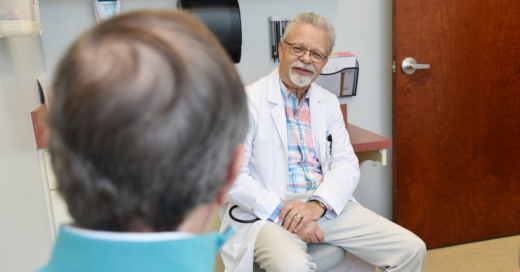
Early colorectal cancer often displays little to no symptoms, which is why screenings are so important. The U.S. Preventive Services Task Force recommends that adults age 50 to 75 get screened for colorectal cancer, but there are other factors that may indicate earlier screening like a family history.
With the incidence of colorectal cancer rates – and deaths from those cancers – rising in adults under 50, the American Cancer Society (ACS) now recommends that routine screenings should begin at age 45 for some.
When making the decision to get a colonoscopy, it is important to have a plan in place. The physicians at Gaston Medical Partners want everyone to remember to discuss these six things with their primary care doctor before scheduling a colonoscopy.
1. Risk Factors
The risk of getting colorectal cancer increases as people get older but getting regular physical activity, maintaining a healthy diet, avoiding smoking and limiting alcohol intake may help lower the risk.
2. Family History
Some people are at increased risk of colorectal cancer because they have inflammatory bowel disease, a personal or family history of colorectal polyps or colorectal cancer, or genetic syndromes like familial adenomatous polyposis (FAP) or hereditary non-polyposis colorectal cancer (also known as Lynch syndrome).
3. Screening Options
There are several screening tests that can be used to find polyps or colorectal cancer. The most common is a colonoscopy and is recommended at a frequency of every 10 years. During a colonoscopy, the doctor uses a long, thin, flexible, lighted tube to check for polyps or cancer inside the rectum and the entire colon. During the test, the doctor can find and remove most polyps and some cancers. A colonoscopy can also be used as a follow-up test if anything unusual is found during one of the other screening tests.
4. Colonoscopy Preparation
Anyone who has had a colonoscopy will say the worst part is drinking the bowel cleansing agent to prepare the night before. This cleansing agent helps to empty the colon and provide the doctor an unobstructed view and access to any polyps or suspicious spots. Here are a few things that can help make the experience more palatable.
- Adjust diet a few days before the colonoscopy. Try to eat less and choose foods low in fiber.
- Put the bowel cleansing agent in the refrigerator at least 24 hours before drinking.
- On the day before a colonoscopy, stick to a liquid diet.
- Stay hydrated.
5. Day of Colonoscopy
It is important to arrive for the colonoscopy at the scheduled appointment time. This allows for patient registration, admission and preparation for the colonoscopy. Some patients with complex medical histories or unique situations may be asked to arrive earlier than scheduled.
All patients undergoing sedation or anesthesia are required to have a designated driver. Many facilities require that the driver remain in the waiting room during the procedure.
6. Getting the Results
All screening test results are provided to the patient’s primary care doctor or gastroenterologist. Patients should discuss scheduling some time with their doctor to review results and discuss next steps.
If patients are concerned about colorectal cancer, they should make a plan for screening with their primary care physician discussing when to screen, which method and how often.
